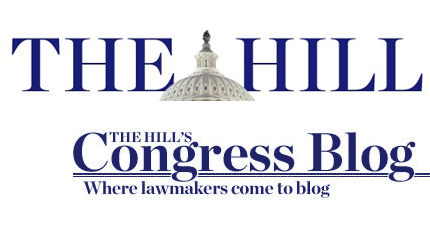Media
MUST READ: “The (potential) sounds of silence” in The Hill, by Tom Schatz, President, Citizens Against Government Waste

January 13, 2016 By Tom Schatz Without songwriters, there would be no music. Main streets and malls would not have reverberated over the past months with happy holiday songs like “I’ll Be Home for Christmas,” “Rudolph the Red Nosed Reindeer” and “Feliz Navidad.” These songs are the product of the creative minds of songwriters, composers and lyricists, but people usually know only the name of the performer, or the artist. Very few people could match the following names with the foregoing songs: Kim Gannon, Walter Kent, and Buck Ram; Joe Beal and Jim Boothe. The most likely match would be Jose Feliciano and Feliz Navidad, since he both wrote and sang the song. While there are always one or a few songwriters, the songs themselves are often recorded by numerous artists. For example, Bing Crosby first recorded I’ll Be Home for Christmas in 1943; it has been re-recorded by Tony Bennett, Kenny Chesney, Kelly Clarkson, Sheryl Crow, Whitney Houston and Frank Sinatra, among many others. Based on the number of times that the song has been sold and played, one would think that the songwriters, without whom no one could have made a recording, would have been compensated fairly and substantially. However, 75 percent of a songwriter’s income is regulated by both outdated and unfair government regulations. The Copyright Act of 1909 established a compulsory license system under with the government set royalties for songwriters who do not perform their own music for compositions embodied on player piano rolls, in an attempt to promote competition in the player piano market. Over time, these rules were applied to records, CDs, and downloaded or on-demand streamed songs. Piano rolls barely exist today, but the heavy-handed regulation intended to prevent a monopoly in that industry continues to undermine songwriters’ property rights in the digital age. The original royalty rate in 1909 was two cents per reproduction of a song; today it is 9.1 cents. In other words, when someone downloads and pays for I’ll Be Home for Christmas, the songwriting team of Gannon, Kent, and Ram share 9.1 cents among them. If the original royalty had been adjusted for inflation, it would now be 50 cents. But the ridiculous royalty is not the only archaic policy hindering innovation by songwriters. For publicly performed music that is heard on the radio, through streaming services like Pandora, and in public venues such as restaurants and bars, a songwriter must rely on performing rights organizations (PROs), such as BMI and ASCAP, to negotiate licenses, collect royalties, and enforce rights on their behalf due to the immense number of entities that use music. These PROs are governed by a Department of Justice (DOJ) consent decree that was first issued in 1941, which denies songwriters and music publishers the ability to negotiate the value of their intellectual property in a free market. To help address this anachronistic and unique treatment of the value of intellectual property, Congress has been considering proposals to modernize the Copyright Act. The House Judiciary Committee has been holding hearings and listening sessions around the country with producers, singers, and songwriters on how the copyright system can be improved. Consumers today have more choices than ever in how, where, and when they listen to music, including radio, satellite radio, television, and mobile devices. There is certainly no “player piano” monopoly threat that the federal government needs to step in and fix. All music should be licensed in the free market, just like other forms of intellectual property. The copyright of a song is a property right that is regulated unlike any similar form of intellectual property. Given the complex and unfair compensation system for songwriters, their works truly are labors of love. If these ancient laws are not modernized, future musical innovation could be stifled. It is past time for the government to get out of the way entirely and let the free market determine the value of a songwriter’s creation. Schatz is president of Citizens Against Government Waste (CAGW). http://thehill.com/blogs/congress-blog/labor/265605-the-potential-sounds-of-silence
